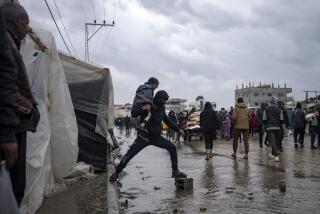Chinese adapt to tent life
- Share via
MIANZHU, CHINA — Life in a tent gets old quickly, but many people are living in far worse conditions or did not even make it through the temblor, Chinese earthquake survivors said Friday.
Tent cities dominate many of the areas hardest hit by the magnitude 7.9 earthquake that struck May 12, killing 70,000 people. These range from well-built structures emblazoned with United Nations, Red Cross and other humanitarian agency logos to slapdash types patched together with sticks, tarp and string.
More tents are arriving from numerous sources as the Chinese government has put them at the top of its donor wish list, and life is slowly being re-created under plastic and canvas, a testament to the resilience of Sichuan province’s residents.
Among the biggest headaches, survivors say, are mosquitoes, heat and boredom.
“You can’t sleep at night with all the bugs, it’s over 100 degrees in the daytime, and there’s no electricity,” said farmer Deng Shiguan, 51, standing on a pile of shattered roof tiles beside his wrecked house in Mianzhu. “And there’s nothing to do all day. We shouldn’t complain though. Many others are far worse off.”
Main street was also being re-created under canvas as tent shopping centers were springing up at major intersections. At a traffic circle on Jingguan Road, 20 merchants hawked clothing, shoes and raw pork beneath tents and oversized umbrellas.
With the economy slowly awakening, there were few reports of price gouging, and many vendors indicated that business was down 20% to 50%. Some survivors found cash in their damaged houses when they returned to salvage their belongings. Others received money from relatives or stipends from the government.
Friday was Wu Ping’s first day selling her lightbulbs, lamps and extension cords. Her store was destroyed and many potential customers were without power, so she had sold only a couple of lamps.
“We’re not waiting around for government help,” she said. “We’re pricing things to move.”
A few feet away, vegetable seller Fan Jiaxi, 43, weighed a pile of celery on a battery-powered scale. He’s started arriving early each day to grab the best spot near the corner.
“Keep standing here,” he said beside a pile of Sichuan chili peppers the size of a pitcher’s mound. “Being interviewed by a foreigner helps my business.”
When Fan wraps up his day selling from a tent, he heads back to eat and sleep in the family tent six miles away. Government officials gave his village only 10 tents for 100 families, so they drew straws. Fan and the others who came up short were forced to make their own shelters. City residents always seem to get preferential treatment over peasants, he said, whether it’s for tents or almost anything else.
Government officials said that as of Friday, about 850,000 tents had been delivered to the disaster area, a fraction of the 3.3 million tents and temporary houses needed.
Along a highway in Mianzhu, a dozen soldiers led by Wu Qiang, 32, a People’s Liberation Army naval officer, erected 15 “garden gazebo” tents made by Camarillo, Calif.-based Pacific Casual. “We’re serving the people,” said Wu, who lost his parents in the quake, as his crew struggled to assemble the tents without instructions, which were in English.
Misappropriation of tents has sparked protests, Internet rage and government finger-wagging. In Gansu province’s Longnan city, 89 tents were being used by government officials and journalists.
“People who don’t distribute tents correctly will be strictly punished,” said a government warning.
Tent life passes in slow motion these days, some survivors in Sichuan province complained, with so many adults unemployed, children out of school and endless hours with little to do.
“This life is bitter,” Shen Dejun said as he stood near his homemade shelter beside Dujiangyan’s ruined Juyuan Middle School, where several hundred students died.
“You have no idea how long you’ll be here,” he said. “You just have to keep your spirits up or you won’t survive.”
Two blocks away, Gou Fanghong, 42, was using trees, wire and tarp to create a makeshift storefront with hands that were badly disfigured in a 1980 construction accident.
He had not figured out what he was going to sell, but he was already worried that the government would force him to tear down the structure.
“Those officials will only worry about us for the next three months. But it will take at least three years to really rebuild,” he said.
“We can’t wait for them. In the meantime, we have to make a living.”
The largely bored, largely captive market has created new business opportunities for some.
Fan Pingao was running a small mobile store, a glass case on the back of a three-wheeled cart filled with razors, flypaper, women’s undergarments and hair clips, that he was driving through the tent cities.
“Radios are a big seller because everyone’s so bored,” he said. “Bras and panties also do well since many women ran out of their collapsing houses so fast they forgot their underwear. And even though they’re living in the dirt, women want something to make themselves feel a little special.”
--
--
Gao Wenhuan of The Times’ Beijing Bureau contributed to this report.
More to Read
Sign up for Essential California
The most important California stories and recommendations in your inbox every morning.
You may occasionally receive promotional content from the Los Angeles Times.










